ScottP here — this week the Big Damn Discussion continues with the episode of Firefly that I’ve seen more than any other and I swear that’s not because it features Christina Hendricks (more recently of Mad Men fame) in a prominent — ahem — role. Now, there’s absolutely no way we can talk about this one without spoilers all over the place, so if you haven’t seen “Our Mrs. Reynolds,” go watch it now. We’ll wait.
See? That didn’t take long at all. I’m not sure how I won the lottery and wound up getting to start this one off, but not only am I probably gonna spend an inordinate amount of time talking about the way the light comes through Ms. Hendricks’ thin (oh so thin) costume at certain times, I’m also gonna mention that I think — Christina Hendricks or no — “Our Mrs. Reynolds” is a definite step up from the last couple episodes.
We’ve been over this ground before, but I have to say, the opening of this episode leaves me even more flabbergasted that a Browncoat once argued with my statement that Firefly is a Western: we start with a stagecoach robbery wherein the bandits meet their comeuppance at the hands of Jayne and Mal (wearing a nice little prairie dress and bonnet), with Zoe as backup for “tactical reasons”. Did that particular Browncoat just pretend all those horses were Thoats and the stagecoach was some sort of unusual landspeeder?
Tanzi: Once again we have Mal and the gang on some kind of caper before the credits, followed by a show about relationships that could take place on just about any kind of show. I’d say it’s a family drama in a western setting with space elements grafted on top. Personally, I’d like to see more of these capers.
ScottD: Man, you’re right — our crew are the straight-up heroes for once, guns-for-hire just like The Magnificent Seven, driving off the bandits. Inara even says something to Mal to that effect, when she encourages him to have a good time at the party. In fact, they are serving as de facto lawmen, hired by the townspeople to enforce justice. And paid with what little the townfolk had, mostly food, just like The Magnificent Seven. Can we have a whole episode with our crew as The Magnificent Seven, please? Maybe Inara can show them some samurai stuff, so we can take the story all the way back to its roots.
ScottP: After Mal and Jayne (and Zoe, with a nice splashing action leap) take care of business, we find ourselves in our third episode in a row involving dancing, but this time it’s more of a hoe-down and less fruity. Mal — in the process of tying one on — finds himself receiving some attention from Saffron (Christina Hendricks), who places a wreath on his head and seems very friendly overall. Soon the dancing does indeed turn fruity (sadly) and we cut to the next day, as Mal and the crew are boarding Serenity to take their leave. Mal is startled to find Saffron hiding in the cargo hold and even more startled when she says she’s his wife.
ScottD: Nathan Fillion shows again that he is a master of the “take”, here with a blink-take, the first of several great takes in this episode.
And Jayne reacts characteristically when Mal claims not to know her:
ScottP: As the rest of the crew gathers around to have a good laugh at the Captain’s expense, Shepherd Book does a little research and finds that the wreath-placing and fruity dancing was indeed a marriage ceremony.
Mal is far from pleased and barks at the others, saying “Me and her got one thing in common — we’re the only ones don’t think this is funny.” As he storms off, the camera lingers on Inara’s face and we can see that Mal isn’t quite right in his statement.
Shepherd Book tells Mal if he takes sexual advantage of Saffron he’ll wind up in a “special hell,” and of course the whole scenario is played (very well, I might add) for all the humor it’s worth.
ScottD: And Joss Whedon (who wrote the script for this ep) won a special place in my heart for equating people who talk at the theater with child molesters.
This presents another “This Ain’t Star Trek” moment. Kirk would have plonked Saffron before the dance was over, converting her from crime and leaving her so fulfilled that she would be too limp to do mischief anyway. (Then he would have improved the genetic stock of the town 5 or 6 more times before he left.) But Mal delivers a speech about propriety that Picard might utter, only less stuffy and British. What’s up with that?
The reason is that the Cowboy Code is firmly in effect. Badmen take advantage of helpless women, good guys don’t. Mal states the Code in so many words to Jayne: “She’s a human woman, doesn’t know a damn thing about the world and needs our protection.”
The Code is also the reason that Mal does not kill Saffron, even though she has given him ample reason as she has actually presented one of the greatest threats to our crew so far. Even the baddest of bad women might find redemption, but at the very least they are female and cowboys don’t shoot women. (It is also the reason that he didn’t kill gang-boss Patience back on Whitefall: though mannish, she is still a woman. So he just shot her horse.)
Joss Whedon envisioned Mal to be a lot like Han Solo — I think Han would have kept Saffron for a while (sharing her with Chewie) then lost her in a card game.
There’s another great take from Nathan Fillion after Saffron asks if he would like her to provide a special service:
ScottP: One particularly funny scene involves Jayne trying to trade his best gun to Mal in exchange for Saffron — Adam Baldwin is so goddamn good here it’s a little bit squeal-inducing.
ScottD: Nathan Fillion gets saddled here with one of those Chinese phrases — in response to Jayne’s offer Mal says [Da-shiang bao-tza shr duh lah doo-tze] = “The explosive diarrhea of an elephant!”, the sort of thing writers slip in to be cute but it’s a mouthful for an actor in any language. Alan Tudyk gets another long phrase, when Saffron is cozyin’ up to Wash: [Wuh duh ma huh tah duh fong kwong duh wai shung] = “Holy mother of god and all her wacky nephews!”
Tanzi: I love the scene with the old guy giving the rain stick to drunken Jayne. Rather than the wise cracks we might expect, Jayne is genuinely amazed by such an amazing device. After he sobers up it’s just “that dumbass stick sounds like it’s raining”. Again, it’s these moments that make us love the guy despite all his faults.
ScottD: And Jayne, who is usually able to come up with all sorts of words when he has something negative to say, gets all tongue-tied when he needs to say something nice — it’s not just the booze:
ScottP: For me, the centerpiece of this episode is the relationship between Zoe and Wash. I’ve mentioned before how natural and real the marriage between the two characters comes off, both in the writing and the performances of Alan Tudyk and Gina Torres, and that natural quality continues in this episode despite what could’ve been a very sitcom-ish situation for the two. Zoe is put off by Saffron’s submissive approach to the art of wifery (wifing? wifeology?) and is more than happy to remind Wash that he’s not gonna be getting his dinner served up in the same way (and that he needs to settle down about the whole thing or he might not get much of anything else). But once Saffron has revealed her true nature (in a hysterically funny scene with Mal) and heads to the bridge to work her feminine wiles on Wash, she’s met with the immoveable object that is Wash’s commitment to his wife. Not in some phony, overly-dramatic declaration of his love for Zoe but rather in a fumbling, awkward, I-can’t-believe-this-is-happening-but-it’s-the-last-thing-I-want kind of way, culminating in Saffron kicking him in the head and knocking him cold. It would be easy to read this scene in entirely the wrong way — that Wash has the hots for Saffron but is scared to death of his “warrior woman” wife, but Alan Tudyk’s stammering, funny performance makes it quite obvious that yes, he finds Saffron attractive but no, straying from the woman he loves is not something he’s interested in doing.
This was covered nicely by Michelle Sagara West in her essay on Zoe and Wash, “More Than a Marriage of Convenience,” from the book Finding Serenity:
The attraction was there — it just wasn’t the only thing that mattered. Because in committed relationships, attraction to other people is always going to exist; it’s just not the driving force that seems to consume so many angst-ridden relationships offered up as “real” to prime-time viewers. Commitment isn’t an accident. It’s not an act of fate. It’s a vow; it’s a focus; it’s a purpose.
“Our Mrs. Reynolds” also builds up a little more of the off-kilter romance between Mal and Inara, delivering moments (and a final line of dialogue) that are funny as hell. I have to admit, though: while I do enjoy the tension between Mal and Inara, that whole relationship never carries an ounce of the realism the Zoe/Wash dynamic does — Mal and Inara’s unrequited love is a dramatic trope more than anything else. That doesn’t make it bad but it never hits with any force, unlike Zoe and Wash’s relationship — and just wait until we get to “War Stories,” in my opinion one of the absolute best episodes of the series, and one that actually makes me a little misty-eyed.
Tanzi: For me the fun part of this episode is the varied reactions of the crew: Zoe and Wash think it’s funny at first, Jayne wants a wife of his own, Kaylee seems happy for the new couple and immediately tries to comfort Saffron when Mal makes her cry (“He makes everyone cry, he’s a monster”). Book is amused but also lays down the law for Mal. And as mentioned, Inara is not amused.
ScottD: This is a dynamic I’ve seen before, in college and at work — when an attractive woman is introduced into a fairly-stable group, the women already in the group react in one of two ways: they play up to the men to get more attention from them (even if that man was not one she would ordinarily do that around) or they punish the men in advance for possibly finding the new female attractive. This pro-active “don’t even think about it” message is a very real phenomenon, and in this episode they nailed it. Inara snaps at Mal (and even Kaylee chews him out, in Chinese: “You don’t deserve her, you fink”), Zoe gets after Wash. Only River is left out, because we are supposed to think of her as a girl. (Though there is an unused scene in the shooting script that has River confronting Saffron and announcing that she’s a thief — turns out Saffron had lifted some food from the galley. I can see why they didn’t use the scene, as it slowed things down.)
Tanzi: I’ve noticed this phenomenon as well, most prominently on Three’s Company. Every time Jack started dating a new woman, Chrissy and Janet suddenly started acting like jealous teenagers. I always wanted to shout at them through the TV: “You’re not sleeping with the guy, leave him alone!”
ScottP: This episode reminded me too of how great the sound design on the show is; ScottD has mentioned it before but the way you can feel the thrum of Serenity‘s engines in different areas of the ship is a thing of beauty and if at all possible, you should crank up the surround sound to enjoy it.
Also, I’d be remiss if I didn’t mention Kaylee’s delightful dimples, and I ain’t talking about the ones on her face…
ScottD: Dude, I was stunned when you told me the other day that you heard someone refer to Christina Hendricks as “that fat chick.” Has our culture gotten so runway-model warped, that the image of “womanly” is basically a teenage boy with two grapefruit in his shirt pockets? Womanly is curvaceous, and Christina/Saffron certainly fits the bill.
Tanzi: The Freudian themes of this episode have probably inspired thousands of term papers so I won’t delve into them too deeply, other than to note the shot of the Serenity flying through the trap wasn’t exactly subtle.
There’s one rather large plot hole in this one that I have to mention, and here come the spoilers so look away if that sort of thing bothers you. Saffron is revealed to be a trained companion who uses her considerable skills to lure men to their doom. How did she infiltrate the small settlement and become one of the clan, so well known and trusted that the village elder presents her to Mal? Living undercover for years in some backwater colony doesn’t seem like a very productive way for a trained companion to make a living. You could say the whole colony is in on it but it doesn’t make sense to kill the people who help you.
ScottD: I’m reasonably sure that the whole story about the elder giving her to Mal is a cover story that Saffron fabricated. (She’s in full-on scam mode, so we really can’t believe anything she says — witness how quickly she comes up with a story when she encounters Inara.) It’s likely that she just hung around the community for a few days picking up enough “color” to make her story believable to Mal, worked her way into the celebration when she saw a target of opportunity, then snuck aboard Serenity. Chances are the elder never knew her name, or ever met her.
Saffron-as-conwoman brings up a theory that I have. I have no evidence to support it, but I think that she is Joss’s version of Angelina, Slippery Jim Di Griz’s wife in Harry Harrison’s Stainless Steel Rat series. (For those of you not familiar, Slippery Jim, “The Stainless Steel Rat”, is a criminal-turned-operative; Angelina is his beautiful brilliant bride, wily and ruthless – she was a sociopath until Jim “cured” her, but she is still a fierce and deadly force when warranted.) I believe that Joss grew up as I did, reading the SSR books and wishing I could be half as dashing and daring as Jim and one quarter as worthy of having an Angelina in my life.
One note that triggered this belief is a little bit toward the end of this episode, where Saffron says, “You’re assuming the payoff is the point.” Her motivations are a form of revenge, proving that she is smarter than most, particularly the men she plays. Angelina has similar motivations. Which makes both of them far more complex and interesting than the average criminal.
And while this episode is all about Saffron (and how the other women react to her) I would maintain that it is equally as much about another lady: Serenity herself.
We have started to think of her as another character in the series — she loomed overhead protectively to break up the bar fight in “The Train Job”, we were relieved to see her show up overhead in “Safe”, and, as ScottP mentioned early on, after just a few episodes her corridors and chambers are as familiar as those of the Enterprise, and in some ways more welcoming. Serenity is our mother, womb, vehicle, and friend, and Saffron is trying to take her away from us, the comely bitch.
To remind us that Serenity is a character, we get to see more of her in this episode than ever before (except for the engine room, which we have already seen and besides, a gentleman doesn’t focus just on a lady’s plumbing…) We see the full scope of her cargo bay:
and her nooks and crannies:
and the full extent of the control room:
(Please be assured that it is totally coincidental that the above image of the control room also happens to feature a delightful silhouette of Zoe’s delightful silhouette.)
It is worth mentioning that, in this scene, Zoe comes up into the control room. Joss Whedon is evidently “very big on verticals”, and told designers to allow for vertical movement whenever possible. Thus all of the stairs/catwalks in the cargo bay, people going up into the control room from either direction, down into their quarters, and the steps into the common area. All of this verticality increases the perception of Serenity not as a set — a series of rooms along the floor of a soundstage — but as a ship, a perception that the actors said helped them inhabit their roles. Since the set is “practical”, with full ceilings and walls not easily moved as in most sets, this also means we of necessity get some of the very interesting camera angles and lens choices that make Firefly visually distinctive.
Property people in the movie biz speak of “hero” props, the ones that actually function and get closeups rather than just look right from a distance. In that respect the whole Serenity set is a “hero” set.
Speaking of Lady Serenity, ScottP brought up relationships and Tanzi brought up matters Freudian and this episode brings up some very serious questions about the sex roles in the Firefly ‘verse so forget a spoiler alert here’s an academic alert ‘cuz I’m gonna go all scholarly on your keisters.
In the book Finding Serenity that ScottP mentioned above, there is an article examining the sex roles in the series. I won’t say I agree with everything the article has to say, but Firefly does skew things decidedly in the male direction. In the course of the series so far, no one is particularly surprised to hear of prostitution or mail-order brides. We see Badger examining a woman as he might consider a horse for purchase. Mal is not surprised that Saffron claims she was being trained up to trade off (though he is outraged that she thinks she might be killed by a displeased husband), and Jayne of course sees nothing wrong with offering to trade for Saffron as he might any possession. The threat of rape is the lead-in for a joke; Mal would be the raped, but he avoids it because he is a man with a gun.
The Firefly ‘verse is a frontier, and on frontiers women are often commodified, their value being their ability to reproduce or to “companion” a man, and they or their services are often sold or bartered. And they are definitely second-class citizens (if they have the vote at all.)
It’s very interesting that, in a culture where Inara is a high-status personage, we have seen no female leaders. (Other than Patience, who is carefully and deliberately shown as mannish.) We saw in “Shindig” that most men think of Inara as arm-candy, to be displayed as one might a prize horse or speedster. Zoe, though a warrior (who face it could very likely take out any male reading this) is a follower — she is strong and intelligent, but it is always a man who comes up with the plan that she follows. Zoe is a significant part of the fray that opens the episode, yet it is Mal who is in charge in a dress — for all the world like a frat boy on stage in the college follies. Kaylee, lovely as she is, is a tomboy and accepted into the world of men because she knows the “masculine” science of engines — she is cute as a button in her party dress, but in a culture where all women are viewed as pretty possessions it’s her knowledge of machinery that draws the fellas in.
The Firefly ‘verse is as masculine as a cattle drive, the power in it as one-sided as the setup in a whorehouse. All of Serenity‘s women are powerful in their own way, but it is still a man’s ‘verse as much as any classic Western.
Which is why Saffron is so peculiarly threatening to the crew. She can perfectly play the demure importuning damsel, seeking safety in appealing to men. But she is also calculating and manipulative and has contempt for the very men she plays with her downcast eyes and “accidental” exposures of her body. (Christina Hendricks is brilliant as she goes from soft-and-helpless to wicked-sharp in a heartbeat.) Inara’s estimation that Saffron has had Companion training makes sense — the insight that Inara uses to please men, Saffron uses to play them. Inara’s life is based upon pleasing men; the more powerful the men she pleases, the more she prospers. Saffron’s delight is proving to men that their power is illusory; she turns their deepest prides about themselves into their downfall — she tells Mal that he is “sweet” and “kind” and “beautiful”, all things he likes to hear as he convinces himself that he is not one of the badmen that he despises. Even when he’s got the drop on her, she still tries to play him by appealing to his self-image.
Saffron is the almost perfect femme-most-definitely-fatale, threatening to men and women alike, able to go from helpless demure damsel to coldly efficient technician in an instant. I think that, had the series continued, Saffron would very likely have ended up on the crew, more ruthless than Jayne, more cunning than Mal, more willing to use her wiles than Inara, perhaps even more engineer-smart than Kaylee — a perfect challenge for everyone aboard.

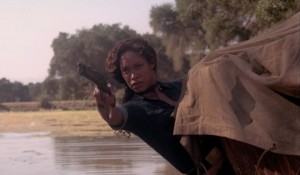
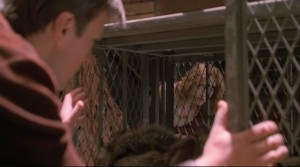

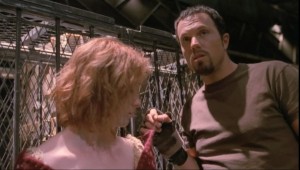
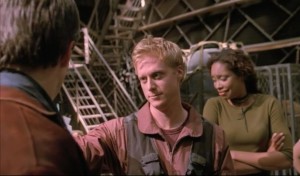
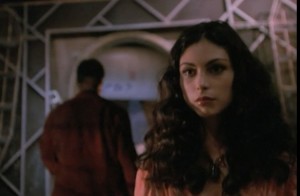
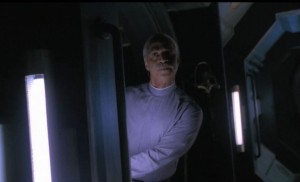
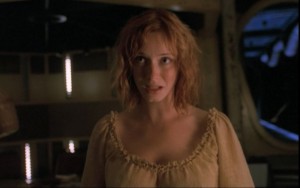
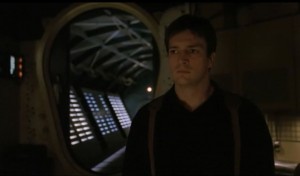
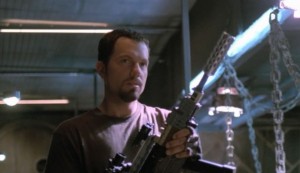
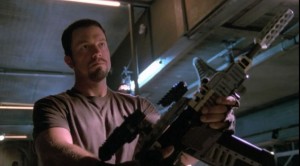
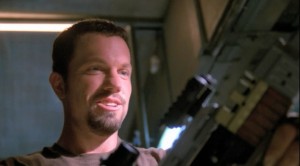
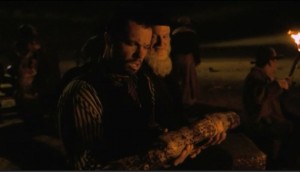
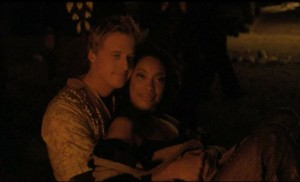
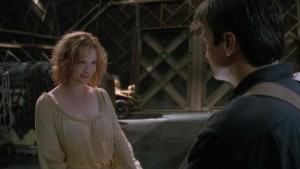
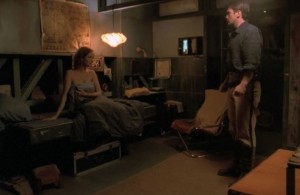
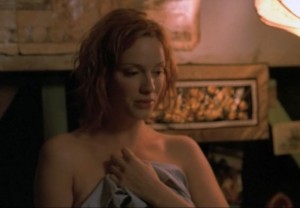
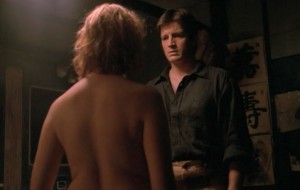

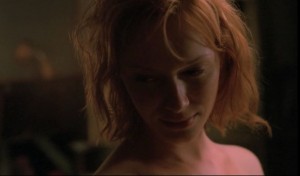


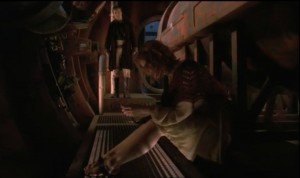
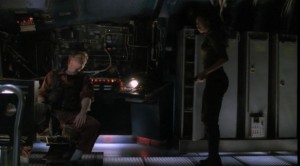

There is one comment